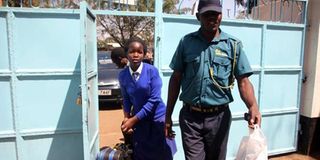Premium
Clashes hamper day one of third term

A security guard at Kisumu Girls High School ushers students through a gate on August 30, 2015. Teachers and their employer are headed for a showdown over salary increases as schools reopen on Monday for the crucial third term. PHOTO | TONNY OMONDI |
What you need to know:
- Classrooms at Tot primary and Tot mixed day secondary in particular are occupied by villagers whose houses in Kabsiren, Kapshoi, Kacheshaban and Kapchesoom were burnt last week in clashes that led to loss of property.
- After a mango fell on him, he added: “You are blessed with good soils, and I also hear that there are plans to set up a university here, so that you can catch up with the rest of the world, but what is going on here will bring down all those dreams.”
At least 15 schools may not open on Monday for the third term following inter-clan clashes that have displaced hundreds of families in Kerio Valley.
Kenya National Union of Teachers (Knut) Marakwet branch has already asked teachers to keep off schools until peace is restored.
Classrooms at Tot primary and Tot mixed day secondary in particular are occupied by villagers whose houses in Kabsiren, Kapshoi, Kacheshaban and Kapchesoom were burnt last week in clashes that led to loss of property.
LAND ROW
School children from the said villages had their books and uniforms burnt in the skirmishes sparked off by a land row in which two clans claim to be the rightful owners.
Other schools affected are Cheswach primary, Top Shiners Academy, Embomir primary, Kerio Valley Boys Secondary, Kapkeny primary, Kipyebo primary and Mogil mixed day secondary.
The violence in Endo Ward was sparked off by the killing of a villager, Mr Charles Kimutai Biwott, 30, a member of Kabisho clan and the subsequent failure by Kabsiren villagers to hand over to the police the ‘known’ murder suspect as demanded by the aggrieved clan.
Similar violence in lower Sambirir Ward was sparked off by the killing of another villager leading to a wave of retaliatory attacks between Kabasiran and Kapkeny locals, that also spilled over to neighbouring villages.
Knut executive secretary John Cheberi asked teachers to keep of the listed schools until security is guaranteed.
“For the safety of the teachers and learners, I urge all teachers not to go to the institutions,” said Mr Cheberi.
Meanwhile, after the conflict that left at least five dead, over a thousand people displaced and several houses torched in Kerio Valley last week, a peace deal spearheaded by Rift Valley Regional Co-ordinator Asman Warfa is gradually starting to bear fruit.
Mr Warfa and Provincial Police boss Gideon Amala led a government team where they used traditional and compelling contemporary reasons to explain to the locals why inter-clan clashes were not part of the current generation.
“I have noticed you live in a beautiful land but whatever you have been doing here belongs to the past. Haven’t you seen the cost of the violence yet?” Mr Warfa said.
After a mango fell on him, he added: “You are blessed with good soils, and I also hear that there are plans to set up a university here, so that you can catch up with the rest of the world, but what is going on here will bring down all those dreams.”
“You (Marakwet) had differences with the Pokot, on the other side of the border, and we have been trying to keep calm. Now you are also fighting against each other, from within, when will we go ahead as a country?”
The administrator regretted that such violence could bar development and scare away investors as he warned the communities of courting trouble by firing at police.
Area politicians including Governor Alex Tolgos and MP Kangogo Bowen and professionals at the meeting were categorical urging the differing factions to heed what the government had said.




